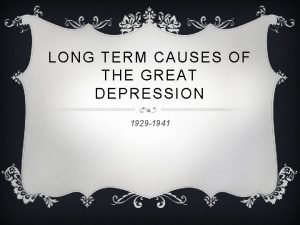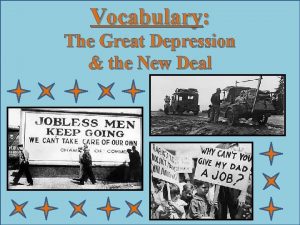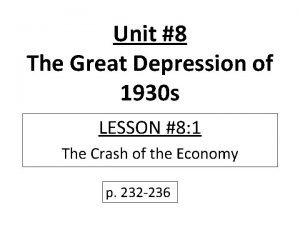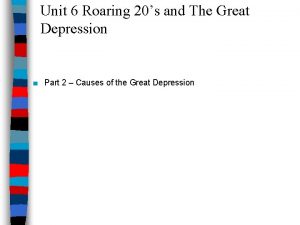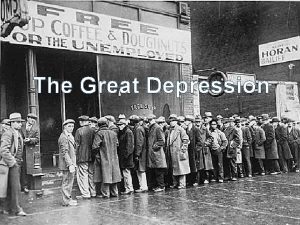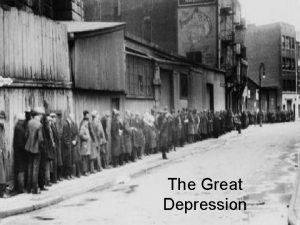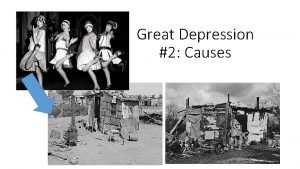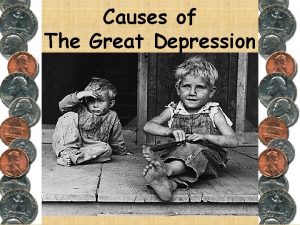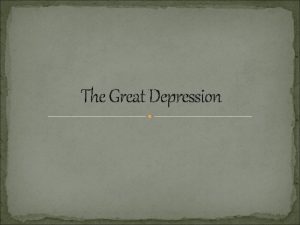The Great Depression Causes of the Depression There











- Slides: 11

The Great Depression

Causes of the Depression • There were many reasons but most analysts agree that it was triggered by the stock market crash of October 24, 1929 also known as "Black Thursday". • Other causes: 1) Overproduction factories had previously produced too many goods which now could not be sold because there was no demand for these goods. 2) To protect their markets countries began to raise tariffs. Canadian industries, such as mining, wheat farming and pulp and paper, were especially hard hit since they depended on export sales to the United States. International trade slowed down. 3) A vicious cycle began, forcing companies to lay off employees, cut back on production or go bankrupt. This further decreased demand for goods. Prices and wages dropped 4) In Canada, the Prairies were hit with a drought i n 1930, which destroyed the wheat crop for several years

Economic Consequences • Canada's resource-based industries such as mining, forestry, and agriculture were very hard hit by shrinking markets and by drastic drops in prices. • Bankruptcies, factory closings and production cutbacks brought about high unemployment and reduced wages

Social Consequences • People lacked the money to buy basic items such as food, clothing and household goods. • Families unable to pay their rents and mortgages were evicted from their homes and farms. • People relied on savings and help from relatives. • Many men, both single and married, "rode the rails" across Canada in search of any kind of work

Political Consequences • As a result of the Depression, several new regional political parties were formed in Canada. • These parties proposed solutions to the economic and social problems which Canadians were facing.

The C. C. F. (Co-operative Commonwealth Federation) • founded in Saskatchewan by J. S. Woodsworth • called on federal government to nationalize banks, public utilities and natural resources • Advocated the abolition of the class system and privileges for the rich. • Proposed establishment of social security schemes such as minimum wage, accident and sickness insurance, old age pensions and unemployment insurance.

SOCIAL CREDIT • founded in Alberta by William (Bible Bill) Aberhart • he called for government take over of banks and greater control of money supply • proposed that government should provide interest-free loans to families

Union Nationale • founded in Quebec by Maurice Duplessis from a coalition of the Action Liberale Nationale and the Conservative Party • called for economic reforms that would help Quebec overcome its problems • promoted traditional and conservative values of Catholic Church and rural life.

Federal Government’s Reaction to the Depression • As the depression worsened, government intervention was used to better the situation however the benefits were limited. • Federal, provincial and municipal governments hired unemployed men to work on public works projects (new roads, park and playground construction, street cleaning). • The federal government organized relief camps for single, unemployed young men who were paid a wage of 20 cents a day

Provincial Reaction to the Depression • Quebec provided direct aid in the form of coupons, which families could redeem for food, clothing and heating fuel. • Churches and charities set up soup kitchens and shelters, where destitute people could get assistance. • The Quebec government, with the support of the Catholic Church , encouraged families to move from the cities to colonize and to settle the Abitibi, Gaspésie and Cote Nord regions • This "back-to-the-land " movement failed because farms were isolated and located where the soil was poor and the growing season was short

Canadian “New Deal” • A Canadian "New Deal" was proposed by Prime Minister Bennett. It included: • the creation of the Bank of Canada in 1934 to control the money supply • federal government initiatives in the construction of roads and railways • the introduction of unemployment insurance and other forms of social security • the re-introduction of protective tariffs for the shoe and textile industries
 Great depression causes
Great depression causes What were the long term causes of the great depression
What were the long term causes of the great depression Wall street crash of 1929
Wall street crash of 1929 The great depression vocabulary
The great depression vocabulary Anxiety in the heart of man causes depression
Anxiety in the heart of man causes depression Proximate causation biology example
Proximate causation biology example Proximate cause ap bio
Proximate cause ap bio Rarig great depression
Rarig great depression Great depression
Great depression The ingenious quarterback political cartoon
The ingenious quarterback political cartoon Foreclosure great depression
Foreclosure great depression Five effects of the great depression
Five effects of the great depression

